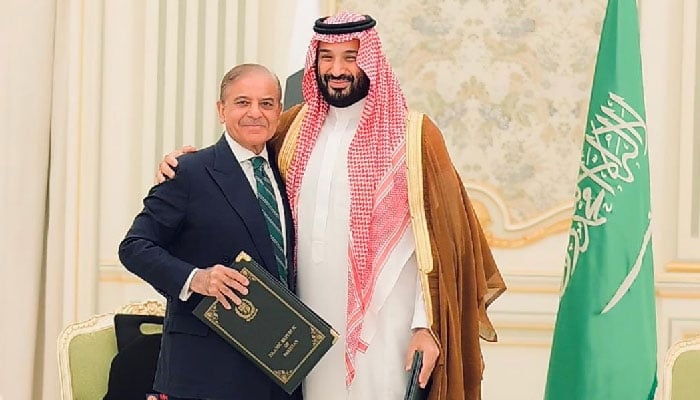Politics
Pak-Saudi alliance not a hostile pact: Israeli media report

The Jerusalem Post has published an opinion piece by Israeli researcher Yoel Guzansky analysing the defence pact between Saudi Arabia and Pakistan, describing it as a declaration with more symbolic than operational weight.
The op-ed, titled ‘A complex reality: Saudi-Pakistani alliance is not a hostile pact against Israel’, argues that while the agreement was widely perceived as a “Muslim version of Nato’s Article 5”, it largely builds on decades of existing ties between the two countries rather than marking a new strategic breakthrough, The News reported
“The defence pact signed last week between Saudi Arabia and Pakistan rightly made headlines”, Guzansky wrote. “Its central clause — stipulating that any attack on one will be considered an attack on both — was widely perceived as dramatic, almost a Muslim version of Nato’s Article 5. Yet behind the declarative language lies a far more complex reality”.
According to the article, Pakistan has had a longstanding military presence in Saudi Arabia, with “between 1,500 and 2,000 Pakistani soldiers… stationed in the kingdom in training, advisory, and security roles”. Guzansky noted that Pakistani troops have been deployed at times of crisis since the 1960s, making the current agreement “part of a long continuum of cooperation rather than a genuine turning point”.
One of the most sensitive aspects, he argued, lies in the nuclear question. “Rumours of a Pakistani ‘nuclear umbrella’ for Saudi Arabia have circulated for years”, Guzansky observed, adding that Riyadh’s financial support for Islamabad’s uranium enrichment programme has fueled such speculation. However, he stressed that “the agreement as published makes no reference to nuclear weapons”, and Pakistan maintains that its arsenal is intended only as deterrence against India.
Guzansky said the timing of the pact reflects Saudi anxieties amid heightened regional tensions, particularly after “Israel’s rare strike in Qatar, a close American ally”, and ongoing clashes between Israel and Iran.
“In an environment of perpetual regional warfare, Riyadh seeks to project that it is not isolated: behind it stands a large, powerful, and nuclear-armed Muslim ally”, he wrote.
But he cautioned that the pact should not be mistaken for an unconditional guarantee. “Pakistan has previously drawn redlines vis-a-vis Riyadh — for example, its refusal in 2015 to join the Saudi-led war in Yemen”.
Similarly, he said that Saudi Arabia is unlikely to intervene militarily in a potential Pakistan-India conflict. “Above all, this is a political declaration: a signal to adversaries, reassurance for domestic audiences, and a reminder to Washington that the Gulf is exploring alternative security options”.
The op-ed stressed that the alliance is underpinned not only by defence but also by “oil credits, financial aid, millions of Pakistani workers in the kingdom, and the binding framework of the Hajj”. Guzansky argued that the new pact, by making relations more public, “magnifies” rather than eliminates ambiguity.
For Israel, he advised caution. “Israel should avoid misinterpreting the pact as a hostile alignment aimed directly at it”, he wrote. Instead, Tel Aviv should “quietly expand its strategic dialogue with Riyadh” while projecting reassurance.
“Ultimately, the Saudi-Pakistani defence pact is more about signalling – to Iran, to domestic audiences, and to Washington — than about binding operational commitments”, Guzansky concluded. “Israel, for its part, should recognise that the Gulf’s strategic map is shifting and ensure that it is perceived not as part of the problem but as a responsible partner in managing regional security”.